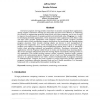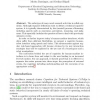185 search results - page 32 / 37 » Refining the Execution of Abstract Actions with Learned Acti... |
AIMSA
2008
Springer
14 years 1 months ago
2008
Springer
Abstract This paper attempts to define an emotional model for virtual agents that behave autonomously in social worlds. We adopt shallow modeling based on the decomposition of the...
ATAL
2011
Springer
12 years 7 months ago
2011
Springer
We develop an algorithm for opponent modeling in large extensive-form games of imperfect information. It works by observing the opponent’s action frequencies and building an opp...
ICPP
1995
IEEE
13 years 11 months ago
1995
IEEE
Interactive program steering permits researchers to monitor and guide their applications during runtime. Interactive steering can help make end users more effective in addressing ...
ECAL
2007
Springer
13 years 11 months ago
2007
Springer
odel of Embodiment on Abstract Systems: from Hierarchy to Heterarchy Kohei Nakajima, Soya Shinkai, Takashi Ikegami A Behavior-Based Model of the Hydra, Phylum Cnidaria Malin Aktius...
HCI
2009
13 years 5 months ago
2009
Abstract. The archetype of many novel research activities is called cognition. Although separate definitions exist to define a technical cognitive system, it is typically character...


